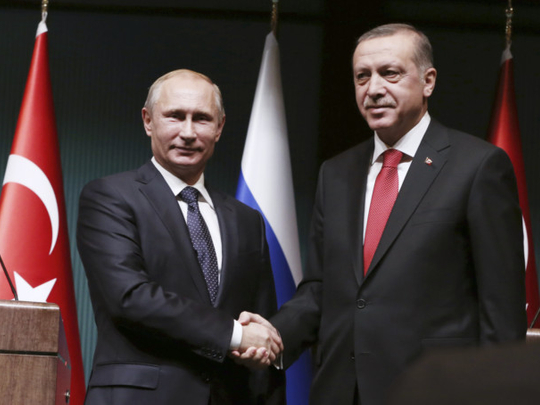
Ever since Russia became something of a rogue state in the eyes of its European energy clients, it has tried to demonstrate that it can mostly do without them — if not immediately, then in a few years’ time. Two major deals have been announced since the annexation of Crimea — one with China and the other with Turkey. It looks increasingly likely, however, that neither of these is a deal in any conventional sense and that Russia is merely putting on a desperate show.
In May, Vladimir Putin went to Beijing to press for a $400 billion (Dh1.47 trillion) contract to send gas to China through a new pipeline, dubbed Power of Siberia. Alexei Miller, head of Russia’s natural gas monopoly, Gazprom, announced that, after some tense negotiations, a final 30-year deal to supply 38 billion of cubic metres of natural gas annually was signed. This appeared to be a major victory for Putin and a warning both to Europeans, who bought 160 billion cubic metres of natural gas from Gazprom last year (30 per cent of their imports), and to Americans, who would like to supply liquefied natural gas to Asian markets.
More than six months on, however, the deal does not appear to be moving forward as hoped. In May, Miller counted on a Chinese advance to start building the $55 billion infrastructure for the project. In November, he declared the loan would not be forthcoming. His explanation was somewhat baffling: “We were negotiating concerning an advance and the advance was an element of the price negotiations. But as we have reached a final agreement on the price, we are not considering the possibility of receiving an advance as a financial instrument to further lower the price.” That would appear to mean that Russia had negotiated a higher gas price with China than it would have received if it had initially asked for an advance. In May, however, Miller had declared that the final terms, including price, had been agreed. Have they been renegotiated in the past six months, or did Miller get a little ahead of himself that May day in Beijing?
It is impossible to know, because no price has been made public. In any case, since Power of Siberia is not expected to be operative until 2019, China would hardly be so careless as to fix the gas price, especially given the current downward trend in oil prices. That makes the project’s future uncertain.
There have also been suggestions that the $55 billion price tag for the Power of Siberia infrastructure may have been too low. In July, Sergei Ivanov, Putin’s chief-of-staff, said it may cost up to $70 billion. And Mikhail Krutikhin, founder of the consultancy East European Gas Analysis, has cited estimates that Gazprom will need $100 billion.
Since then, under Ukraine-related sanctions, Gazprom is unable to raise the money in western financial markets. The only possible source of funding is Russia’s state National Welfare Fund. But other state companies, such as Rosneft, are also making major demands on this fund. If the sanctions and low oil prices persist, the $80 billion fund — meant to plug Russia’s pension-system deficit — will not have enough money to go around.
The Turkish deal, meant to replace the South Stream pipeline, which the European Union has blocked, has had less impressive optics from the start. It would keep Gazprom from losing the $5 billion already invested in building the Russian end of South Stream and allow it to honour contracts for laying pipe across the bottom of the Black Sea. But delivering gas to Turkey would make its route to Europe more circuitous and it would allow Turkey to dictate terms if Russia wants to “reduce Ukraine’s role as a gas transit country to zero”, as Miller promised to do last week.
Turkish energy minister Taner Yildiz denies the existence of a firm deal with Russia, according to the commodity-markets information service Platts. Yes, Putin and Turkish Prime Minister Recep Tayyip Erdogan agreed to keep talking about diverting the Black Sea pipeline to Turkey, but that would involve resolving a few contentious issues.
Putin’s offer to Turkey of a 6 per cent discount on gas already being supplied is not enough, according to Yildiz, who says his country has made a counter offer. Besides, Turkey wants Gazprom to stop giving its own subsidiary, Bosphorus Gaz, priority over Turkish partners. When these negotiations are done, Russia may end up supplying Turkish intermediaries with gas at a much lower price than it would have received from European consumers at the other end of South Stream.
Russia’s purpose in presenting unfinished talks with China and Turkey as done deals is obvious: It needs to convince the West that it need not stop meddling in Ukraine under any circumstances because it can form alternative partnerships. Authoritarian leaders such as Chinese President Xi Jinping and Turkish President Recep Tayyip Erdogan are willing to help Putin put on a brave face — but not if that means sacrificing their own countries’ economic benefit. Knowing how limited Putin’s options are as the oil price falls, the harder they will press him on the energy deals.
— Washington Post
Berlin-based writer Leonid Bershidsky is a contributor to Bloomberg View.









